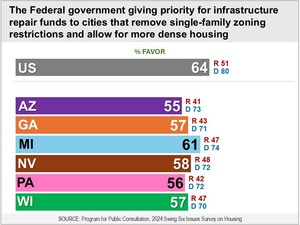Over Eight in Ten American Voters Favor US Continuing to Be Part of NATO, New PPC Survey Finds
Nine in Ten Do Not Support Threatening to Withdraw from NATO if Europeans Do Not Increase Military Spending
WASHINGTON, April 3, 2019 /PRNewswire/ -- Celebrations of the 70th anniversary of NATO on April 4 may be clouded by concerns about statements by Donald Trump questioning the US commitment to NATO, the North Atlantic Treaty Organization. However, 83% of American voters favor the US continuing to be part of NATO, including 90% of Democrats, but also 77% of Republicans and 76% of those who voted for Trump, according to a new survey by the Program for Public Consultation (PPC).
The survey of 2,416 registered voters, conducted by the University of Maryland's Program for Public Consultation, was released today by the nonpartisan organization Voice of the People.
Concerns about the US commitment to NATO have been sparked by Donald Trump's characterization of NATO as "obsolete," and his statement that he might consider withdrawing the US from NATO if other NATO members do not increase their military spending.
Respondents were informed about the controversy stemming from US pressure to get European NATO allies to spend more on their militaries. While the European allies have agreed to raise their spending to two percent of GDP, many have failed to do so.
Presented three options, only 12% endorsed pressing European allies "to spend more on their military and say that if they do not the US will disengage from Europe militarily and possibly withdraw from NATO"—21% of Republicans, 4% of Democrats. Thirty-five percent favored pressing the Europeans but not making threats.
The most popular idea—supported by 50% was to "remain part of NATO but reduce US military investments in Europe to bring them more in line with the level that the Europeans make" (Republicans 47%, Democrats 50%).
"Only a small minority of Americans show interest in withdrawing from NATO or using the threat to do so as a source of leverage," commented Steven Kull, director of PPC.
To ensure that respondents understood the issue, they were first given a short briefing on NATO including the commitment to defend any ally that comes under attack. The content was reviewed by experts on the issues to ensure the briefing was accurate and balanced, and the strongest arguments were presented.
Respondents were then asked to evaluate arguments for and against remaining in NATO. The arguments in favor of remaining were found convincing by very large majorities. These included the argument that Russia is still a potential threat to Europe and it is in the US' interests to help Europe contain them (85% found this convincing), as well as the argument that NATO is a useful symbol for each country's commitment to peace and democracy, and a necessary tool to ensure the continuation of free and open trade (82% convincing).
Far fewer – no more than four in ten – found the arguments against remaining in NATO convincing. They included the argument that Russia is not a real threat and US security commitments enable countries to be unnecessarily provocative (40%), as well as the argument that having a military alliance targeted clearly at Russia violates the post-Cold War understanding between the US and Russia and is therefore destabilizing (35%).
While 83% of the sample finally approved of the US continuing to be part of NATO, millennials (age 18-34) were only slightly lower at 77%. Steven Kull comments, "It is interesting that millennials who came of age after the end of the Cold War are still overwhelmingly in favor of the NATO alliance."
The survey was conducted online from Jan. 16 – Feb. 11 with a national probability-based sample of 2,416 registered voters, provided by Nielsen Scarborough from their sample of respondents, who were recruited by mail and telephone using a random sample of households. The margin of error is +/- 2.0%.
- Report: http://www.publicconsultation.org/nato_report_0419/
- Questionnaire: http://www.publicconsultation.org/nato_quaire_0419/
Contact: Steven Kull
[email protected] or 202-232-7500
SOURCE Program for Public Consultation
WANT YOUR COMPANY'S NEWS FEATURED ON PRNEWSWIRE.COM?
Newsrooms &
Influencers
Digital Media
Outlets
Journalists
Opted In




Share this article